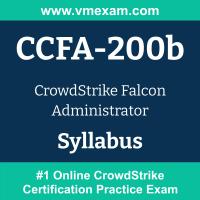 The CrowdStrike CCFA-200b exam preparation guide is designed to provide candidates with necessary information about the Falcon Administrator exam. It includes exam summary, sample questions, practice test, objectives and ways to interpret the exam objectives to enable candidates to assess the types of questions-answers that may be asked during the CrowdStrike Certified Falcon Administrator (CCFA) exam.
The CrowdStrike CCFA-200b exam preparation guide is designed to provide candidates with necessary information about the Falcon Administrator exam. It includes exam summary, sample questions, practice test, objectives and ways to interpret the exam objectives to enable candidates to assess the types of questions-answers that may be asked during the CrowdStrike Certified Falcon Administrator (CCFA) exam.
It is recommended for all the candidates to refer the CCFA-200b objectives and sample questions provided in this preparation guide. The CrowdStrike CCFA certification is mainly targeted to the candidates who want to build their career in Falcon Platform domain and demonstrate their expertise. We suggest you to use practice exam listed in this cert guide to get used to with exam environment and identify the knowledge areas where you need more work prior to taking the actual CrowdStrike Falcon Administrator exam.
CrowdStrike CCFA-200b Exam Summary:
| Exam Name | CrowdStrike Falcon Administrator |
| Exam Code | CCFA-200b |
| Exam Price | $250 USD |
| Duration | 90 minutes |
| Number of Questions | 60 |
| Passing Score | 80% |
| Recommended Training / Books | CCFA Training |
| Schedule Exam | PEARSON VUE |
| Sample Questions | CrowdStrike CCFA Sample Questions |
| Recommended Practice | CrowdStrike Certified Falcon Administrator (CCFA) Practice Test |
CrowdStrike Falcon Administrator Syllabus:
| Section | Objectives |
|---|---|
| User Management |
- Determine roles required for access to features and functionality in the Falcon console - Create roles and assign users to roles based on desired permissions - Manage API keys |
| Sensor Deployment |
- Determine prerequisites to successfully install a Falcon sensor on supported operating systems - Analyze the default policies and apply the best practices to prepare workloads for the Falcon sensor - Uninstall a sensor - Troubleshoot a sensor |
| Host Management and Setup |
- Understand how filtering might be used in the Host Management page - Disable detections for a host - Explain the effect of disabling detections on a host - Explain the impact of Reduced Functionality Mode (RFM) and why it might be caused - Find hosts in RFM - Locate inactive sensors - Recall how long inactive sensors are retained - Determine relevant reports specific to host management |
| Group Creation |
- Determine the appropriate group assignment for endpoints and understand how this impacts the application of policies - Apply best practices when managing host groups |
| Policy Application |
- Determine the appropriate prevention policy settings for endpoints and explain how this impacts security posture - Determine the appropriate sensor update policy settings in order to control the update process - Apply roles and policy settings, and track and review Falcon RTR audit logs in order to manage user activity - Understand the functionality of a containment policy - Configure a containment policy for IP address or subnet exclusions that will apply to network contained hosts based on security workflow requirements - Understand options and requirements to manage quarantined files |
| Rules Configuration |
- Create custom IOA rules to monitor for behavior that is not fundamentally malicious - Interpret business requirements in order to allow trusted activity, resolve false positives and fix performance issues - Assess IOC settings required for customized security posturing and to manage false positives - Understand configurations for CID wide management within General Settings |
| Dashboards and Reports |
- Understand the different types of sensor reports and their use cases - Understand the different audit logs and their use cases |
| Workflows | - Configure workflows to respond to defined triggers |
